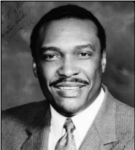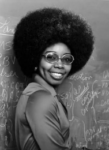February marks a special time of year when we recognize the many contributions Black Americans have made to society as we know it, while also acknowledging the inequities that continue to stand in the way of progress. Black innovators have contributed to the advancement of technology across multiple verticals while overcoming institutional barriers
to market entry. Still today, these barriers often result in diminished access to opportunity, capital, and essential intellectual property right protections. In celebration of Black History Month, we are highlighting some incredible Black innovators and working to create space for future generations of Black Americans in tech.
 Hailing from Tennessee State University, historically black college and university (HBCU) graduate Jesse Russell acquired dozens of patents in wireless technology that were fundamental to the development of the modern cell phone. His inventions include the first digital cellular base station, and his patents include those for a mobile data telephone and various wireless communication technologies.
Hailing from Tennessee State University, historically black college and university (HBCU) graduate Jesse Russell acquired dozens of patents in wireless technology that were fundamental to the development of the modern cell phone. His inventions include the first digital cellular base station, and his patents include those for a mobile data telephone and various wireless communication technologies.
 American scientist and inventor Valerie Thomas graduated from Morgan State University (another HBCU) as one of only two women majoring in physics. Her love of math and science steered her to a career at NASA in 1964, where she led a team that developed an image processing system that sent the first satellite images to Earth. Thomas is also the creator and patent holder for an illusion transmitter, a technology still used today by NASA, surgeons, and TV screen producers that utilize concave mirrors to create 3D images.
American scientist and inventor Valerie Thomas graduated from Morgan State University (another HBCU) as one of only two women majoring in physics. Her love of math and science steered her to a career at NASA in 1964, where she led a team that developed an image processing system that sent the first satellite images to Earth. Thomas is also the creator and patent holder for an illusion transmitter, a technology still used today by NASA, surgeons, and TV screen producers that utilize concave mirrors to create 3D images.
 Electrical engineer and IBM computer scientist Dr. Mark Dean was born in the small town of Jefferson City, Tennessee, where he displayed a passion for ingenuity at a young age. Over the course of his 30-year career at IBM, he contributed three of the nine patents needed to develop the personal computer in 1981. His inventions include the first color monitor and the ISA system bus, which allows external equipment like printers, speakers, and scanners to be plugged into computers, revolutionizing personal computing.
Electrical engineer and IBM computer scientist Dr. Mark Dean was born in the small town of Jefferson City, Tennessee, where he displayed a passion for ingenuity at a young age. Over the course of his 30-year career at IBM, he contributed three of the nine patents needed to develop the personal computer in 1981. His inventions include the first color monitor and the ISA system bus, which allows external equipment like printers, speakers, and scanners to be plugged into computers, revolutionizing personal computing.
 A trailblazer in wireless innovation, Marian Croak holds more than 200 patents and was inducted into the National Inventors Hall of Fame in 2022. One of her most notable patents was for the technology that enables cellphone users to donate money to organizations using text messaging. She developed this technology during the aftermath of Hurricane Katrina, and it transformed how people give to charitable organizations when natural disaster strikes.
A trailblazer in wireless innovation, Marian Croak holds more than 200 patents and was inducted into the National Inventors Hall of Fame in 2022. One of her most notable patents was for the technology that enables cellphone users to donate money to organizations using text messaging. She developed this technology during the aftermath of Hurricane Katrina, and it transformed how people give to charitable organizations when natural disaster strikes.
In celebrating the rich history of Black American inventors this Black History Month, we must honor their legacy by investing in the communities and institutions that are nurturing the next Jesse Russell, Valerie Thomas, Mark Dean, and Marian Croak. The App Association is committed to providing equitable access to resources and opportunities to the next generation of leaders in tech, recognizing that the future of innovation and the app economy depend on it. Many tech-based internships typically attract students from select schools and backgrounds, and we are committed to breaking that narrative. The App Association is thrilled to announce our HBCU Undergraduate Internship Program for summer 2023. For more information, please reach out to Leanna Wade ([email protected]) or Caleb Williamson ([email protected]).